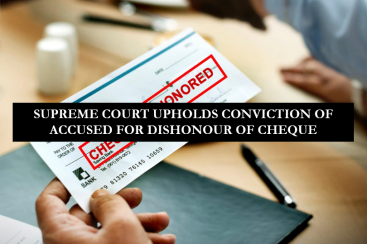SUPREME COURT UPHOLDS CONVICTION OF ACCUSED FOR DISHONOUR OF CHEQUE
A Three Judge Bench of the Hon’ble #SupremeCourt of India comprising of Justices N.V. Ramana, Surya Kant and A.S. Bopanna passed a #Judgment dated 23-09-2021 in the case of Triyambak S. Hegde Vs. Sripad Criminal Appeal Nos.849850 of 2011 and reiterated that when a person receives a #cheque from a person for discharge of debt or liability and the cheque is #dishonoured in terms of Section 138 of the #NegotiableInstruments Act, 1881 (Act), then the #presumption shall remain in favor of the holder of the cheque, unless the contrary is proved by the accused, under Section 139 of the Act.
Section 139 of the Act is reproduced below:
Presumption in favour of holder.—It shall be presumed, unless the contrary is proved, that the holder of a cheque received the cheque of the nature referred to in section 138 for the discharge, in whole or in part, of any debt or other liability.
In the present case, the Respondent, Mr. Sripad approached the Appellant, Mr. Triyambak S. Hegde and informed him that he was facing a financial crunch because of which he intends to sell the house situated in Sirsi town. The Appellant agreed to purchase the same for the negotiated total sale consideration of Rs. 4,00,000/. An Agreement dated 06-06-1996 was executed by the Parties and the Respondent received an advance amount of Rs. 3,50,000/. Thereafter, the Appellant made some queries and discovered that the house was registered in the name of the father of the Respondent and that the Respondent did not have the authority to sell the same. Subsequently, the Appellant demanded the return of advance payment of Rs. 3,50,000/. The Respondent did not pay the entire amount, but issued a Cheque dated 17-05-1998 for the sum of Rs. 1,50,000/ (Cheque). On 20-05-1998, the Appellant presented the Cheque in a Bank for realisation, but the same got dishonoured with the endorsement of ‘insufficient funds’.
A Notice was then issued by the Appellant to the Respondent, thereby, informing the latter about the Cheque being dishonoured and further demanded payment of the Cheque amount. The Respondent received the Notice, but did not respond to the same. Subsequently, on 14-07-1998, the Appellant filed a Complaint under Section 200 of the Code of Criminal Procedure (CrPC) in the Court of the Judicial Magistrate, First Class (JMFC) at Sirsi which was registered as Criminal Case No.790/2000. The Complaint filed by the Appellant sought to prosecute the Respondent under Section 138 of the Act. The JMFC passed a Judgment dated 09-06-2005 and convicted the Respondent for dishonour of Cheque under Section 138 of the Act and sentenced the Respondent to undergo simple imprisonment for six months and to pay fine of Rs. 2,00,000/.
However, as the Respondent committed default in payment of fine amount, he was ordered to undergo simple imprisonment for a further period of three months. Out of the total fine amount the Respondent was asked to pay Rs.1,95,000/ to the Appellant as compensation.
Aggrieved by the Order dated 09-06-2005, the Respondent filed an Appeal before the District and Sessions Judge, Uttara Kannada, Karwar in Criminal Appeal No.57/2005. On the other hand, the Appellant also filed a Criminal Appeal No. 65/2005 before the District and Sessions Judge seeking that the compensation of Rs. 1,95,000/ was insufficient, hence, the sentence imposed by JMFC should be enhanced. However, vide Judgments dated 22-04-2006, both the Appeals were dismissed.
Thereafter, the Respondent filed a Criminal Revision Petition No.1282/2006 and the Appellant filed the connected Revision Petition No.1481/2006 before the High Court of Karnataka (High Court). The Single Judge vide Order dated 01-12-2009 allowed the Revision Petition filed by the Respondent and set aside the conviction Order passed by the Learned JMFC.
Aggrieved, a Criminal Appeal was filed in the Hon’ble Supreme Court of India. In Appeal, the Appellant contended that as the Respondent-Accused had admitted to his signature in the Cheque that later got dishonoured, the presumption raised by the Magistrate in favor of the Cheque Holder, i.e. the Appellant was justified and the conviction was not bad in law.
After taking into consideration the arguments advanced by the Parties, the Apex Court placed reliance on the case of Basalingappa vs. Mudibasappa (2019) 5 SCC 418, and made the following observations:
- “Once the execution of cheque is admitted, Section 139 of the Act mandates a presumption that the cheque was for the discharge of any debt or other liability.
- The presumption under Section 139 is rebuttable presumption and the onus is on the accused to raise the probable defence. The standard of proof for rebutting the presumption is that of preponderance of probabilities.
- To rebut the presumption, it is open for the accused to rely on evidence led by him or the accused can also rely on the materials submitted by the complainant in order to raise a probable defence. Inference of preponderance of probabilities can be drawn not only from the materials brought on record by the parties but also by reference to the circumstances upon which they rely.”
After examining the facts of the case, the Bench opined that “the case put forth by the accused does not satisfy the requirement of rebuttal even if tested on the touchstone of preponderance of probability. Therefore, in the present facts it cannot be held that the presumption which had arisen in favour of the appellant had been successfully rebutted by the respondent herein.”
Thus, the Apex Court while partly allowing the Appeal, set aside the Order dated 01-12-2009 which was passed by the High Court and upheld the Order of Conviction passed by the Learned JMFC. However, while upholding the conviction, the Supreme Court directed the Respondent-Accused to pay a sum of Rs. 2,50,000 within three months, instead of undergoing imprisonment.
Suchitra Upadhyay
Associate
The Indian Lawyer & Allied Services
Edited by
Sushila Ram Varma
Chief Consultant and Editor
The Indian Lawyer & Allied Services





































Leave a Reply